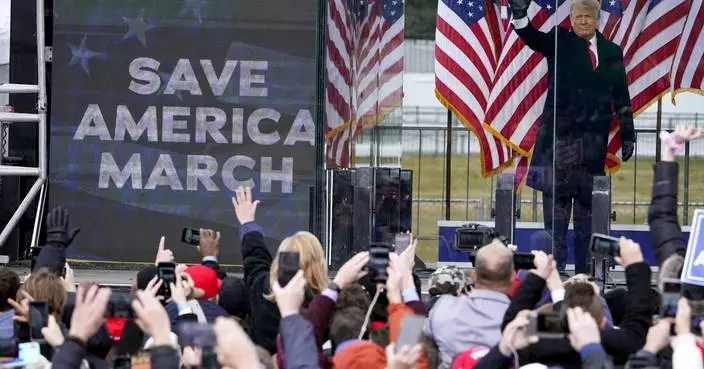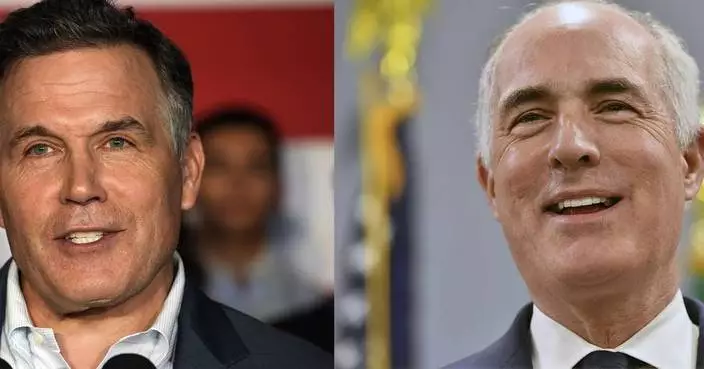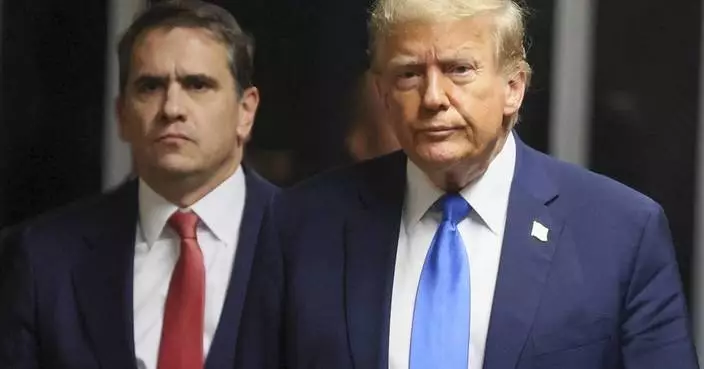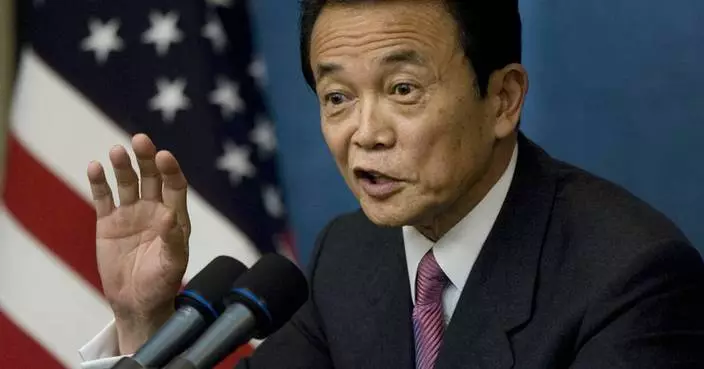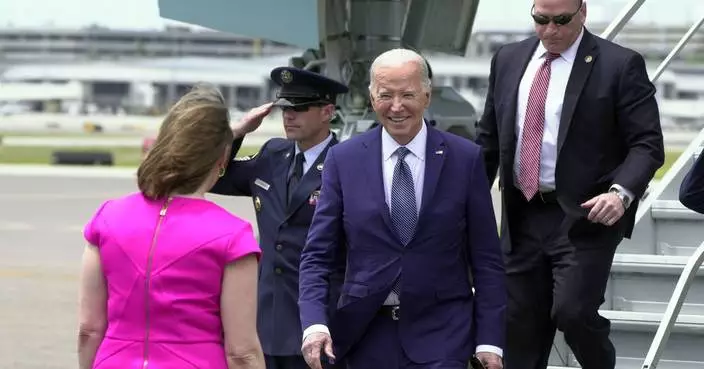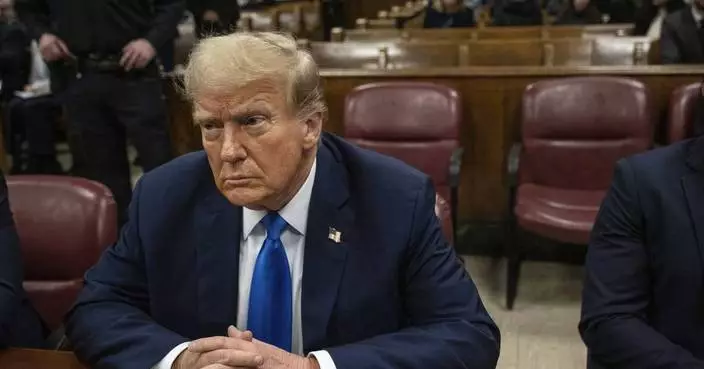President Donald Trump lent credence Thursday to reports that FBI informants had infiltrated his presidential campaign, saying that "if so, this is bigger than Watergate!"
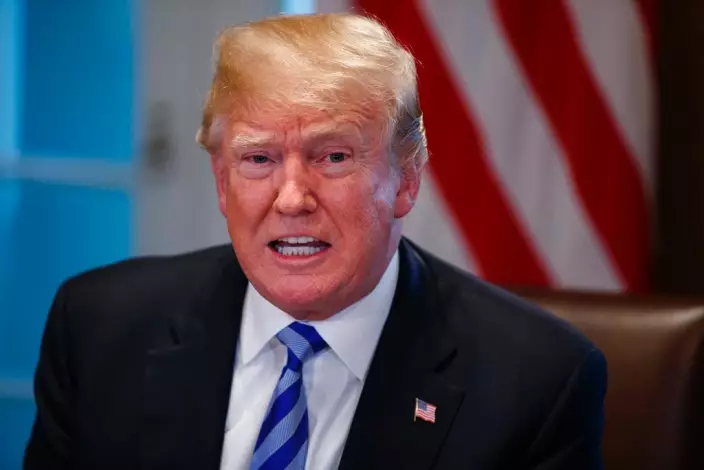
President Donald Trump speaks during a roundtable on immigration policy in California, in the Cabinet Room of the White House, Wednesday, May 16, 2018, in Washington. (AP Photo/Evan Vucci)
Trump made the comment on the anniversary of Robert Mueller's appointment as special counsel to head the Justice Department investigation into possible coordination between Russia and Trump campaign official. Trump has repeatedly called the investigation a "witch hunt."
"Wow, word seems to be coming out that the Obama FBI 'SPIED ON THE TRUMP CAMPAIGN WITH AN EMBEDDED INFORMANT,'" Trump tweeted. "Andrew McCarthy says, 'There's probably no doubt that they had at least one confidential informant in the campaign.' If so, this is bigger than Watergate!"
McCarthy, a contributing editor at the National Review, wrote an article published last week headlined "Did the FBI Have a Spy in the Trump Campaign?"
The New York Times reported separately this week that at least one government informant met several times with Carter Page and George Papadopoulos, both former foreign policy advisers on Trump's Republican campaign. The newspaper attributed the information to current and former FBI officials.
White House spokeswoman Sarah Huckabee Sanders said if the reports are proved true, "it should certainly be looked into."
The Watergate scandal in the early 1970s occurred following a break-in by five men at Democratic Party headquarters at the Watergate building in Washington and subsequent attempts by the administration of President Richard Nixon to hide its involvement. Nixon, a Republican, ultimately resigned from office as a result of the ensuing investigation.
Meanwhile, Trump's attorney Rudy Giuliani said that the president still wants to testify in the Russia probe.
Speaking Thursday on "Fox and Friends," the former New York mayor said Trump will only sit down with Mueller if "we feel there's a way to shorten this thing." He added that Trump remains eager to offer his "side of the case."
Giuliani has been urging Mueller's team to wrap up the investigation now that the probe has reached the one-year mark.
Giuliani's team has been weighing whether to allow Trump to sit for an interview with Mueller. He said the legal team is "pretty comfortable, in the circumstances of this case, that they wouldn't be able to subpoena him personally."
While the Supreme Court has never definitively ruled on the subject, it appears that a sitting president could be forced to testify. In 1974, justices held unanimously that a president could be compelled to comply with a subpoena for tapes and documents.
If Trump were subpoenaed and did not want to testify, he could always invoke his constitutional right not to testify against himself and decline to answer questions. But that act would pose significant political risk.
Giuliani also repeated that Mueller's team has indicated it would not attempt to indict Trump, as he told The Associated Press on Friday. Justice Department legal opinions from 1973 and 2000 have suggested that a sitting president is immune from indictment and that criminal charges would undermine the commander in chief's ability to do the job.
Giuliani told Fox News Channel's Laura Ingraham on Wednesday that Mueller "has all the facts to make a decision" after 12 months investigating Russian meddling in the election and possible collusion with Trump's campaign.
"Mueller should now bring this to a close," said Giuliani. "It's been a year. He's gotten 1.4 million documents, he's interviewed 28 witnesses. And he has nothing, which is why he wants to bring the president into an interview."
"It's about time to say enough. We've tortured this president enough," he added, describing the investigation as being "like a big weight" on the president's back.
So far, the special counsel's office has charged 19 people — including four Trump campaign advisers — and three Russian companies. Trump's former national security adviser, Michael Flynn, and his deputy campaign chairman, Rick Gates, have pleaded guilty and are now cooperating with the probe.
Trump, however, has panned it as a "witch hunt" intended to discredit his presidency and has insisted that Russia had nothing to do with his winning campaign.
Giuliani, who is working for the president pro bono, said Wednesday that the probe "is not good for the American people, and the special counsel's office doesn't seem to have that sort of understanding that they're interfering with things that are much bigger than them."
WASHINGTON (AP) — For Senate Republican leader Mitch McConnell and House Speaker Mike Johnson, the necessity of providing Ukraine with weapons and other aid as it fends off Russia's invasion is rooted in their earliest and most formative political memories.
McConnell, 82, tells the story of his father’s letters from Eastern Europe in 1945, at the end of World War II, when the foot soldier observed that the Russians were “going to be a big problem” before the communist takeover to come. Johnson, 30 years younger, came of age as the Cold War was ending.
As both men pushed their party this week to support a $95 billion aid package that sends support to Ukraine, as well as Israel, Taiwan and humanitarian missions, they labeled themselves “Reagan Republicans” an described the fight against Russian President Vladimir Putin in terms of U.S. strength and leadership. But the all-out effort to get the legislation through Congress left both of them grappling with an entirely new Republican Party shaped by former President Donald Trump.
While McConnell, R-Ky., and Johnson, R-La., took different approaches to handling Trump, the presumptive White House nominee in 2024, the struggle highlighted the fundamental battle within the GOP: Will conservatives continue their march toward Trump’s “America First” doctrine on foreign affairs or will they find the value in standing with America's allies? And is the GOP still the party of Ronald Reagan?
“I think we’re having an internal debate about that,” McConnell said in an interview with The Associated Press. “I’m a Reagan guy and I think today — at least on this episode — we turned the tables on the isolationists.”
Still, he acknowledged, “that doesn’t mean they’re going to go away forever.”
McConnell, in the twilight of his 18-year tenure as Republican leader, lauded a momentary victory Tuesday as a healthy showing of 31 Republicans voted for the foreign aid; that was nine more than had supported it in February. He said that was a trend in the right direction.
McConnell, who has been in the Senate since 1985, said passing the legislation was “one of the most important things I’ve ever dealt with where I had an impact."
But it wasn’t without cost.
He said last month he would step away from his job as leader next year after internal clashes over the money for Ukraine and the direction of the party.
For Johnson, just six months into his job as speaker, the political crosscurrents are even more difficult. He is clinging to his leadership post as right-wing Republicans threaten to oust him for putting the aid to Ukraine to a vote. While McConnell has embraced American leadership abroad his entire career, Johnson only recently gave complete support to the package.
Johnson has been careful not to portray passage as a triumph when a majority of his own House Republicans opposed the bill. He skipped a celebratory news conference afterward, describing it as “not a perfect piece of legislation” in brief remarks.
But he also borrowed terms popularized by Reagan, saying aggression from Russia, China and Iran “threatens the free world and it demands American leadership.”
“If we turn our backs right now, the consequences could be devastating,” he said.
Hard-line conservatives, including some who are threatening a snap vote on his leadership, are irate, saying the aid was vastly out of line with what Republican voters want. They condemned both Johnson and McConnell for supporting it.
“House Republican leadership sold out Americans and passed a bill that sends $95 billion to other countries,” said Republican Sen. Tommy Tuberville of Alabama, who opposed the bill. He said the legislation "undermines America's interests abroad and paves our nation's path to bankruptcy.”
Johnson has been lauded by much of Washington for doing what he called “the right thing" at a perilous moment for himself and the world.
“He is fundamentally an honorable person,” said Senate Majority Leader Chuck Schumer, D-N.Y., who brokered the negotiations and spent hours on the phone and in meetings with Johnson, McConnell and the White House.
Sen. Mitt Romney, R-Utah, said Johnson and McConnell “both showed great resolve and backbone and true leadership at a time it was desperately needed.”
When McConnell began negotiations over President Joe Biden's initial aid request last year, he quickly set the terms for a deal. He and Schumer agreed to pair any aid for Ukraine with help for Israel, Schumer said, and McConnell demanded policy changes at the U.S. border with Mexico.
On McConnell's mind, he said, was that Trump was “unenthusiastic” about providing more aid to Kyiv. Yet McConnell, whose office displays a portrait of every Republican president since Reagan with the exception of Trump, had a virtually nonexistent relationship with the man he often refers to not by name, but simply as “the former president.”
Still, Trump would prove to hold powerful sway. When a deal on border security neared completion after months of work, Trump eviscerated the proposal as insufficient and a “gift” to Biden's reelection. Conservatives, including Johnson, rejected it out of hand.
With the border deal dead, McConnell pushed ahead with Schumer on the foreign aid, with the border policies stripped out, solidifying their unusual alliance. The Senate leaders met weekly throughout the negotiation.
“We disagreed on a whole lot, but we really stuck together,” Schumer said.
“We just persisted. We could not give up on this."
Meanwhile, a small group of GOP senators began working on an idea they thought could give Johnson some political wiggle room. Sens. Lindsey Graham of South Carolina, Kevin Cramer of North Dakota and Markwayne Mullin of Oklahoma took an idea that Trump had raised — structuring the aid to Ukraine as a loan — and tried to make it reality.
Through a series of phone calls with Trump, several House members, as well as the speaker, they worked to structure roughly $9 billion in economic aid for Ukraine as forgivable loans — just as it was in the final package.
“Our approach this time was to make sure that the politics were set, meaning that President Trump is on board,” Mullin said.
The conversations culminated in Johnson making a quick jaunt to Florida, where he stood side by side with Trump at his Florida club just days before moving ahead with the Ukraine legislation in the House.
It was all enough, with Democratic help, to get the bill across the finish line. The legislation, which Biden signed into law on Wednesday, included some revisions from the Senate bill, including the loan structure and a provision to seize frozen Russian central bank assets to rebuild Ukraine. Nine GOP senators who had opposed the first version of the bill swung to “yes” largely because of the changes Johnson had made.
The result was a strong showing for the foreign aid in the Senate, even though the decision could prove costly for Johnson.
What comes next on Ukraine is anyone's guess.
While the $61 billion for Ukraine in the package is expected to help the country withstand Moscow's offensive this year, more assistance will surely be needed. Republicans, exhausted after a grueling fight, largely shrugged off questions about the future.
“This one wasn’t easy,” Mullin said.
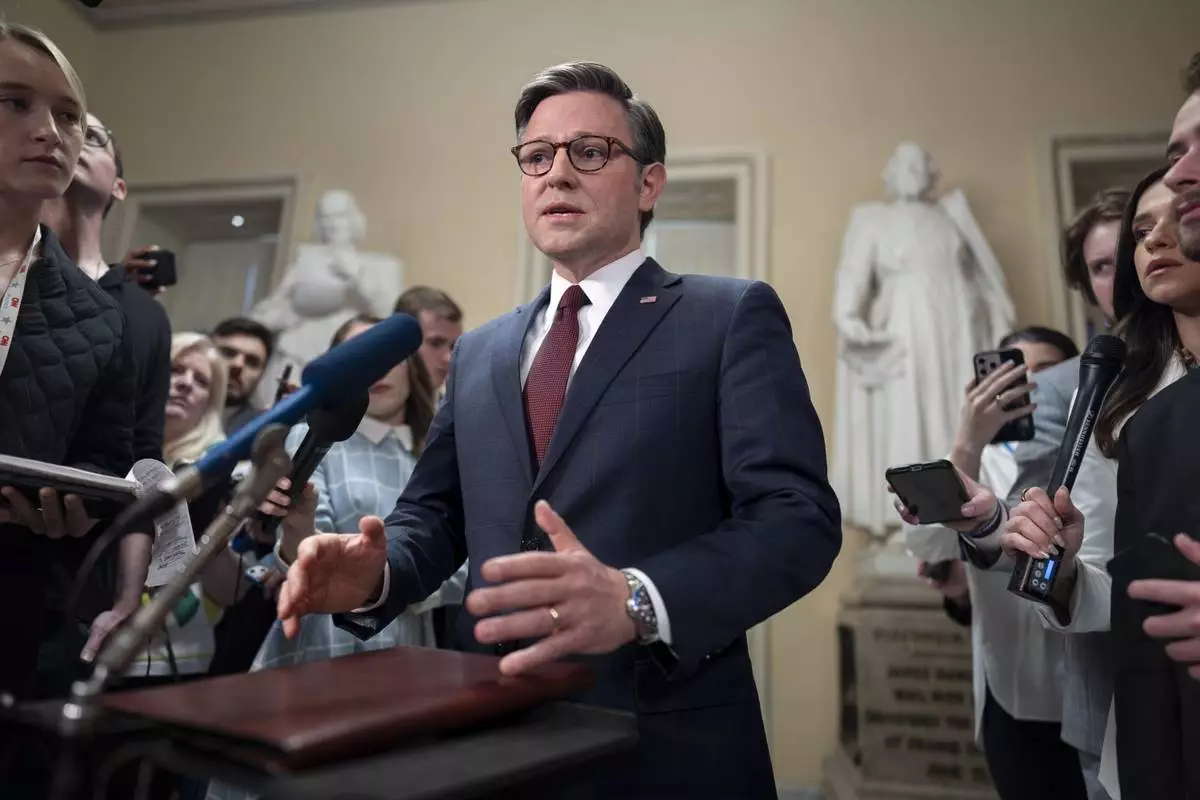
Speaker of the House Mike Johnson, R-La., talks to reporters just after the House voted to approve $95 billion in foreign aid for Ukraine, Israel and other U.S. allies, at the Capitol in Washington, Saturday, April 20, 2024. (AP Photo/J. Scott Applewhite)
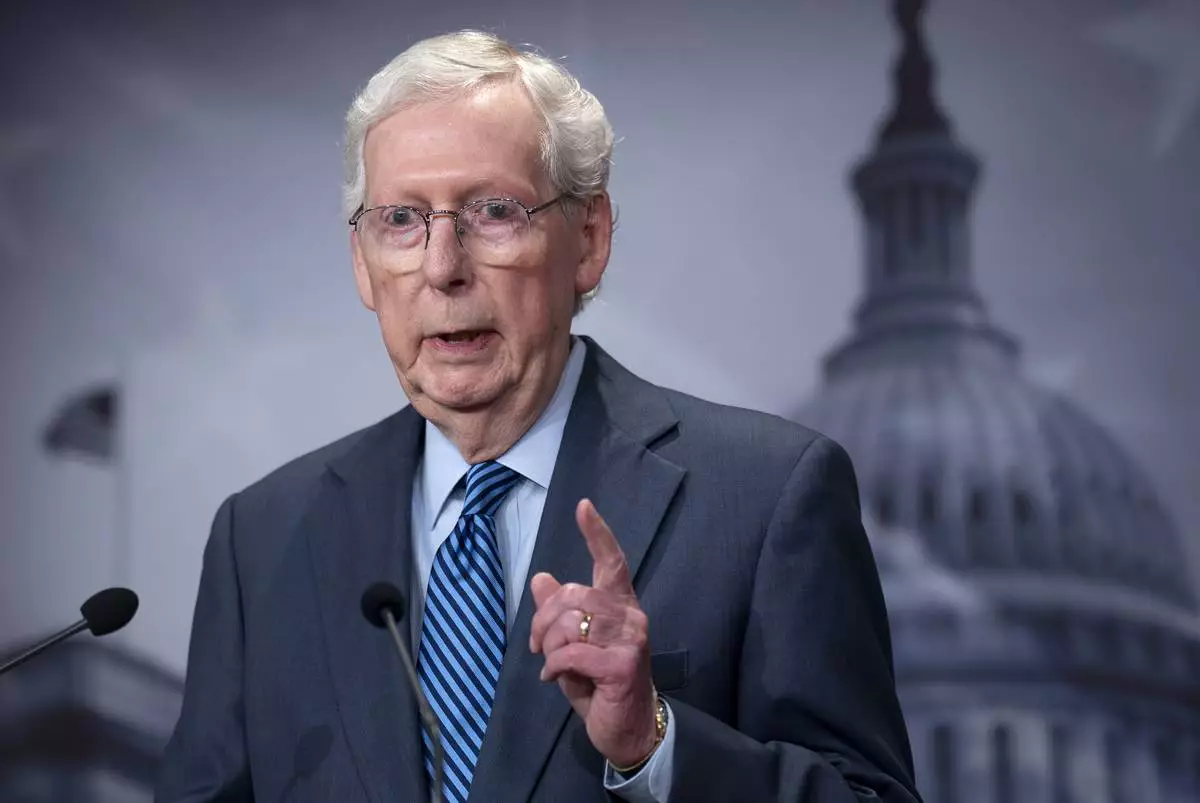
Senate Minority Leader Mitch McConnell, R-Ky., praises support for Ukraine as the Senate is on track to pass $95 billion in war aid to Ukraine, Israel and Taiwan, at the Capitol in Washington, Tuesday, April 23, 2024. (AP Photo/J. Scott Applewhite)
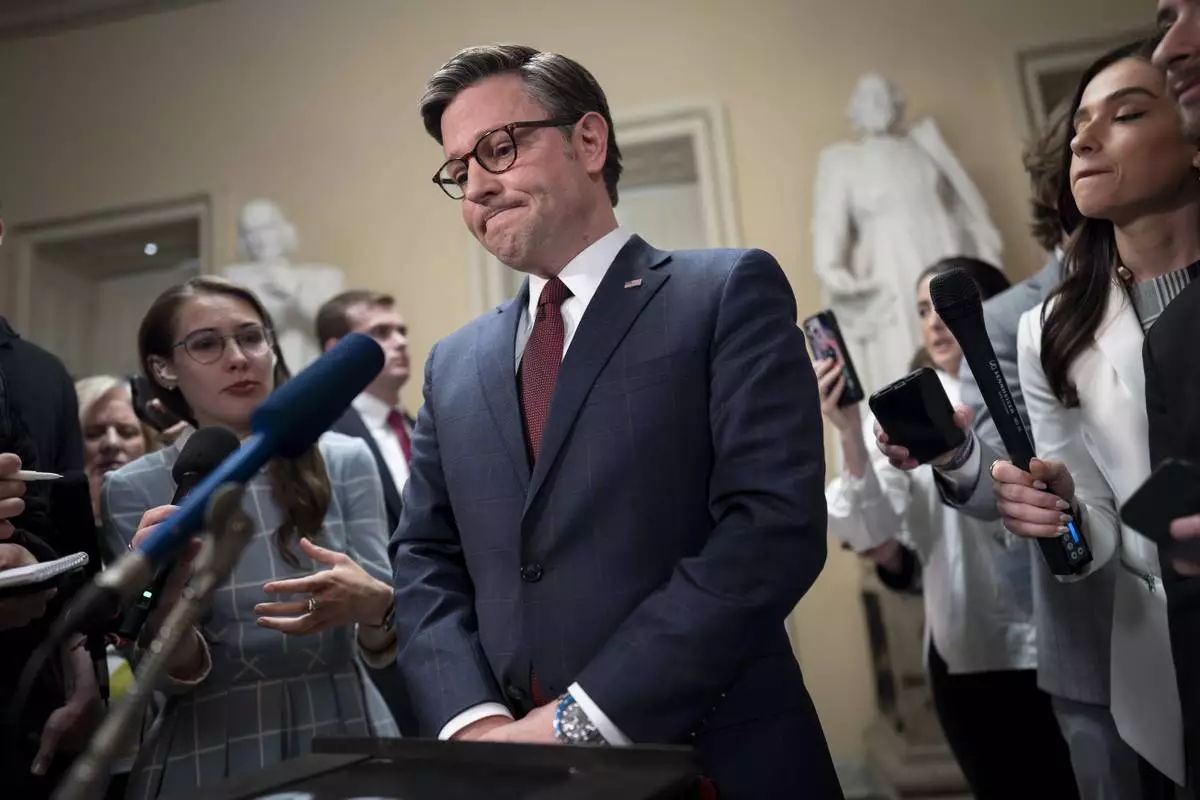
Speaker of the House Mike Johnson, R-La., talks to reporters just after the House voted to approve $95 billion in foreign aid for Ukraine, Israel and other U.S. allies, at the Capitol in Washington, Saturday, April 20, 2024. (AP Photo/J. Scott Applewhite)
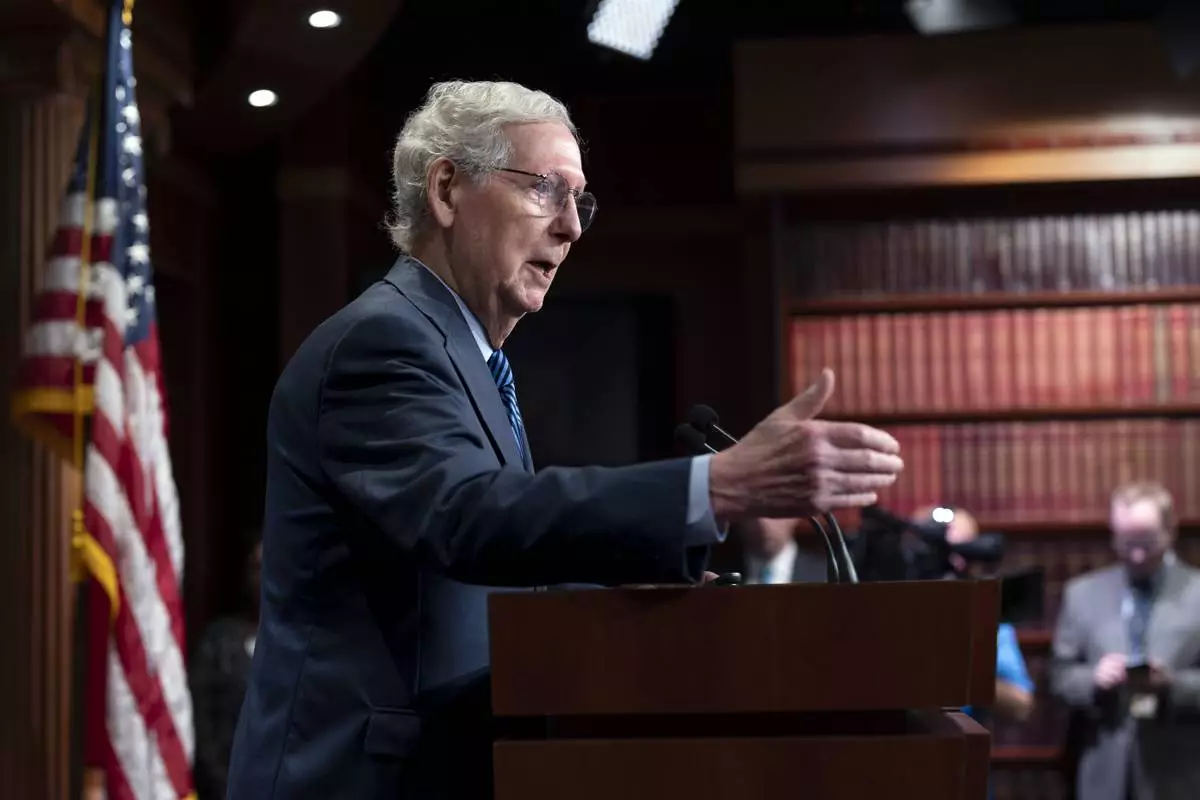
Senate Minority Leader Mitch McConnell, R-Ky., praises support for Ukraine as the Senate is on track to pass $95 billion in war aid to Ukraine, Israel and Taiwan, at the Capitol in Washington, Tuesday, April 23, 2024. (AP Photo/J. Scott Applewhite)
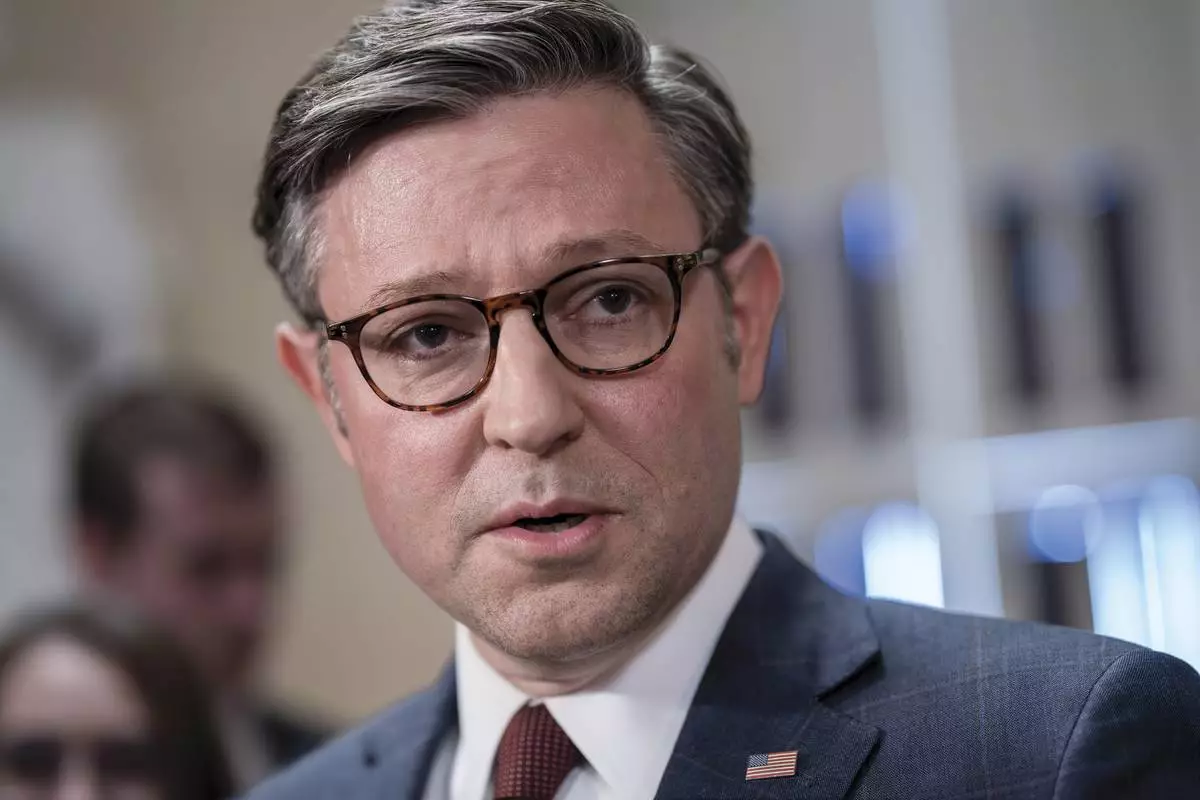
Speaker of the House Mike Johnson, R-La., talks to reporters just after the House voted to approve $95 billion in foreign aid for Ukraine, Israel and other U.S. allies, at the Capitol in Washington, Saturday, April 20, 2024. (AP Photo/J. Scott Applewhite)
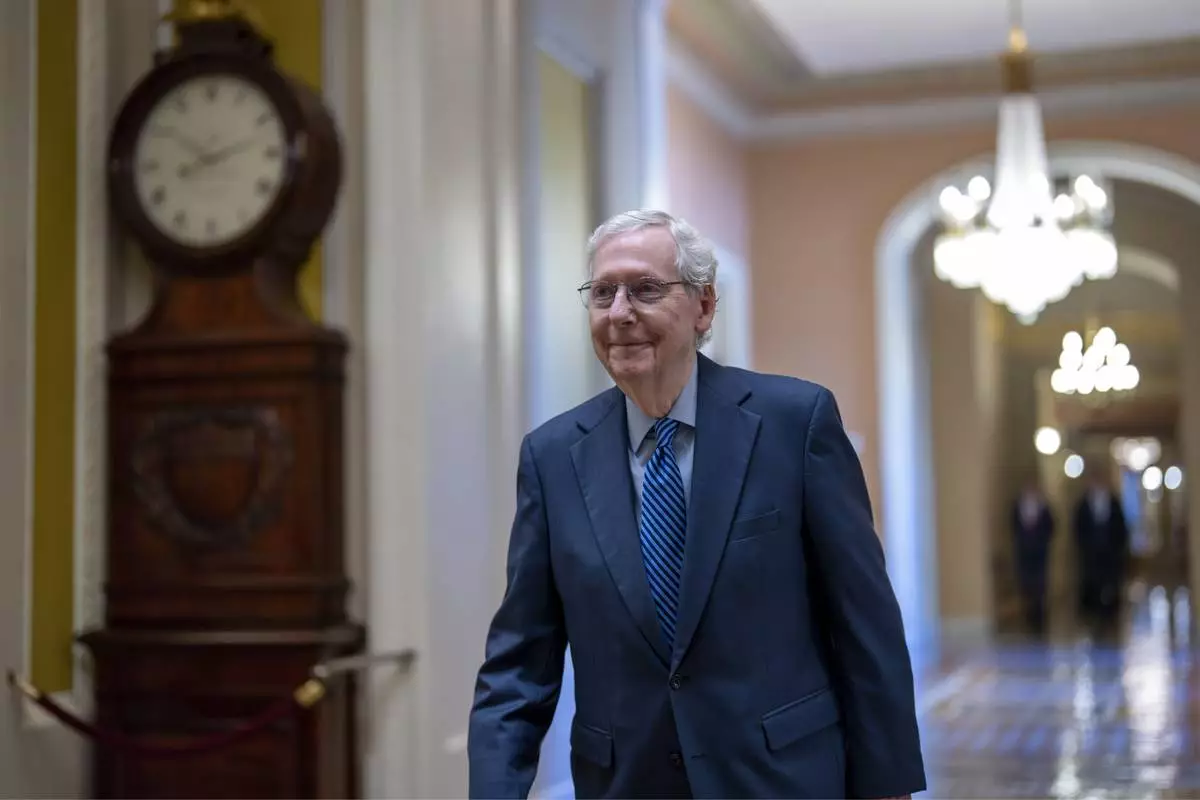
Senate Minority Leader Mitch McConnell, R-Ky., walks to the chamber as the Senate prepares to advance the $95 billion aid package for Ukraine, Israel and Taiwan passed by the House, at the Capitol in Washington, Tuesday, April 23, 2024. (AP Photo/J. Scott Applewhite)










